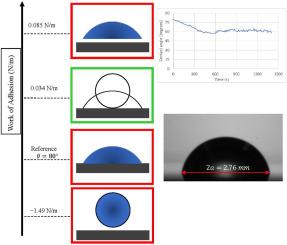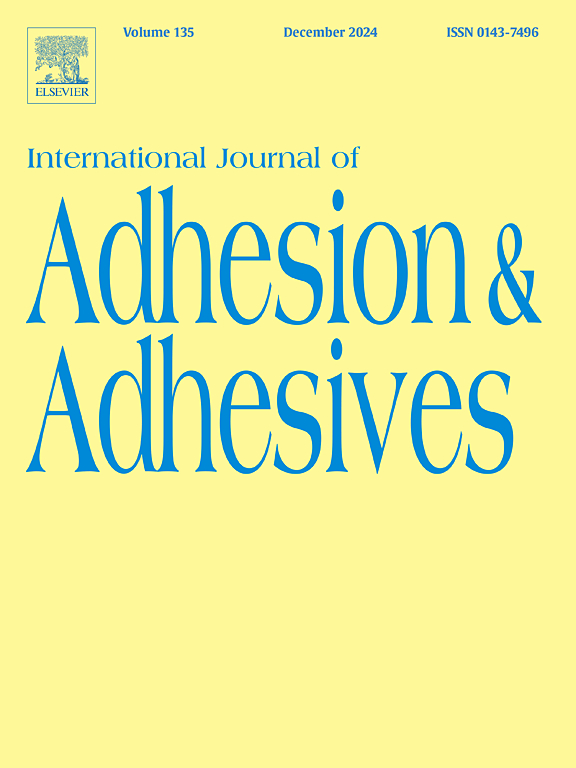无梗水滴附着功的再认识
IF 3.2
3区 材料科学
Q2 ENGINEERING, CHEMICAL
International Journal of Adhesion and Adhesives
Pub Date : 2024-10-28
DOI:10.1016/j.ijadhadh.2024.103872
引用次数: 0
摘要
界面单位面积的附着功,用于分离两个不同的相,并形成新的界面。对于无柄液滴,通常使用 Young-Dupre 公式来表示粘附功,但它假定新形成的液滴在脱离后形状保持不变,这是不正确的。此外,液滴的初始形状和最终形状也无法提供粘附功。我们认为,粘附功取决于路径(尽管有内能),并提出了一种计算粘附功的方法,其基础是计算脱离过程中的机械功,即液滴中心点位移乘以外部阻力的积分。以 4 μl 无柄水滴为研究对象,其初始(前进)和后退接触角分别为 79.7° ± 0.9°、60.2° ± 0.8°。使用本文开发的方法直接计算粘附功为 0.03 J/m2,而 Young-Dupre 则为 0.085 J/m2,根据水滴的初始(无柄)和最终(全球形)状态计算粘附功为负值,即 -1.49 J/m2。因此,无论是 Young-Dupre 关系还是液滴的初始和最终能量状态都不能用来计算附着功,在计算附着功时应考虑脱离路径。本文章由计算机程序翻译,如有差异,请以英文原文为准。

The sessile drop work of adhesion revisited
Work of adhesion per unit area of the interface to separate two distinct phases, and creating new interfaces. For the case of sessile drop, the Young-Dupre equation is usually used to express the work of adhesion, but it assumes the newly formed drop preserves its shape after detachment, which is not correct. Also, initial and final drop shapes cannot provide the work of adhesion. We argued that the work of adhesion depends on the path (despite the internal energy), and suggest a methodology to calculate the work of adhesion, based on calculating the mechanical work during the detachment, i.e. integration of drop centroid displacement times the external resistive forces. To put things into perspective, a 4 sessile water drop was studied with initial (advancing) and receding contact angles of 79.7° ± 0.9°, 60.2° ± 0.8°, respectively. The direct calculation of work of adhesion using the developed methodology in this paper gives 0.03 J/m2, while Young-Dupre gives 0.085 J/m2, and calculating the work of adhesion based on initial (sessile) and final (full sphere) states of the drop gives a negative value, i.e. −1.49 J/m2. So, neither Young-Dupre relation nor the initial and final energy states of drop can be used to calculate the work of adhesion, and detachment path should be considered in the calculation of work of adhesion.
求助全文
通过发布文献求助,成功后即可免费获取论文全文。
去求助
来源期刊

International Journal of Adhesion and Adhesives
工程技术-材料科学:综合
CiteScore
6.90
自引率
8.80%
发文量
200
审稿时长
8.3 months
期刊介绍:
The International Journal of Adhesion and Adhesives draws together the many aspects of the science and technology of adhesive materials, from fundamental research and development work to industrial applications. Subject areas covered include: interfacial interactions, surface chemistry, methods of testing, accumulation of test data on physical and mechanical properties, environmental effects, new adhesive materials, sealants, design of bonded joints, and manufacturing technology.
 求助内容:
求助内容: 应助结果提醒方式:
应助结果提醒方式:


